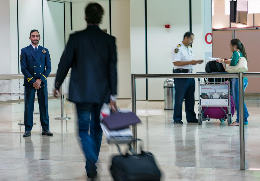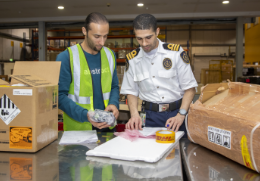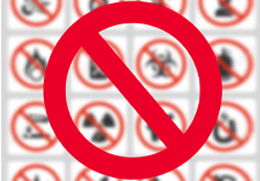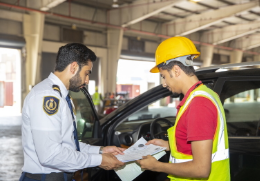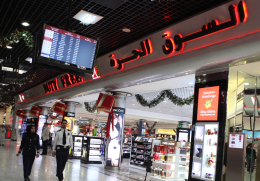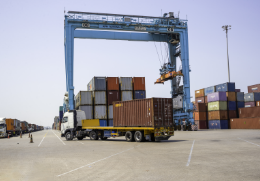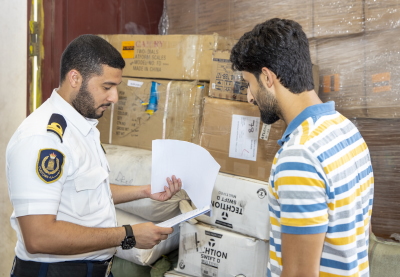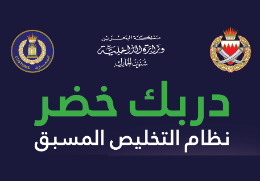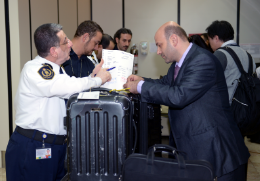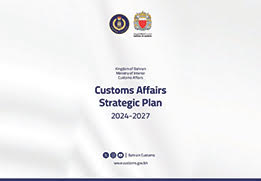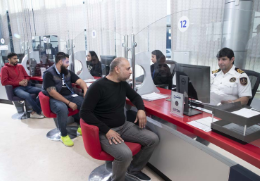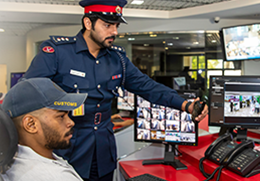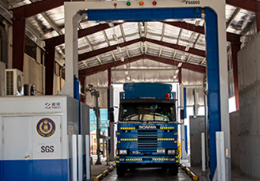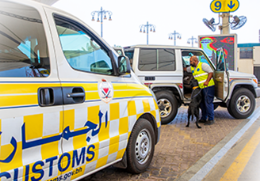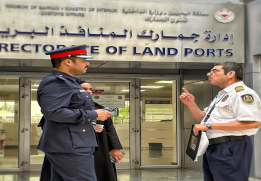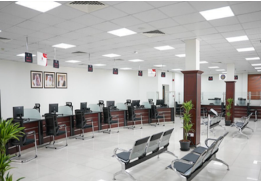

FAQs
- Upon arrival of the vehicle to the customs entry point (imports), an inspection is carried out and entering the vehicle data onto the system.
- The vehicle driver is directed to the x-ray unit where the customs officer will inspect the vehicle and issue a form bearing all information related to the vehicle. The form is submitted to the shift operations office to register the owner authorization onto the Ofoq system to prepare a customs declaration by the clearing agent.
- The vehicle owner along with the clearing agent is to complete the technical inspection by the Traffic and Licenses Department and complete other relevant procedures.
- The competent customs officer will value the vehicle and review other attached documents.
- The clearing agent will complete other payment steps and receiving the inspection plates of the vehicle from the Traffic Department office at the Causeway, and permit of release.
- The competent customs officer at the operations office will issue the vehicle customs card and exit permit, then handover the vehicle to the owner or clearing agent after signing the receipt form.
Procedures:
- A customs declaration is organized by the importer, representative or a clearing agent (authorized).
- All requirements and relevant documents are submitted to the Customs Department.
- All goods are subject to Customs "Duties" as per the unified customs tariff table unless exempted in line with the GCC member states unified customs "law", or by virtue of an enforced economic agreement within GCC member states, or any other international agreement within the GCC.
- Goods are subject to inspection and examination as per the risk standards criteria. The customs declaration is thereto printed as per the accredited automated clearing system at the customs department.
- Issue an exit note and release of goods.
Individuals – Electronic Purchases
• Goods such as new items, gifts, personal effects, commercial items that are subject to customs duties being imported in a mail parcel whether normal or courier, require clearing by a customs officer at the mail sorting compound in the Kingdom of Bahrain (in Hidd).
• Customs Duties Payable Parcels:
A detailed list of the parcels consisting of customs duties payable parcels is prepared by Customs at the mail office. The parcel recipient is notified by the mail office with respect to the status of the parcel by virtue of a "notification letter" to attend in person to receive the parcel, which is delivered after being inspected by a Customs Officer at the mail office where the recipient or his representative must be present. All Customs duties must be paid before releasing the parcel.
• Parcels containing items not subject to customs duties (personal use). Such items and non-restricted items which aggregated value amounts to BHD 300 will be forwarded directly to the mail office (branches in all the Kingdom of Bahrain governorates) . The sender must attach the invoice with the parcel to facilitate customs clearing.
• Parcels containing prohibited or restricted goods (personal or commercial).
• Personal Restricted Goods
a) The import of prohibited items which aggregated value amounts to BHD 300 requires the approval of a competent regulatory authority (Point of Entry). The parcel owner must be present at the customs office where the parcel is inspected in his presence. The parcel is both seized and forwarded to the point of entry via agents attached to a receipt, where the parcel owner must go in person or his representative to complete the process of receipt directly from the offices of the competent regulatory authority.
b) Commercial Items Subject to Regulatory Authorities
If the parcels are of a commercial nature and require a permit from a regulatory authority, the items are seized while a sample of the same is delivered by virtue of a receipt until such time when a permit is obtained, and all due taxes and duties are paid.
Parcels requiring a previous approval from a regulatory authority are maintained at Customs of a mail office. A sender is notified to obtain a permit/approval from the competent regulatory authority. The parcel is thereto released after submitting a permit or approval, and payment of the customs duties.
The following goods are availed temporary entry:
• Machinery, heavy equipment to complete project or to undertake practical and scientific experiments of the same.
• Foreign goods imported for the purpose of manufacturing completion.
• Temporary imports for sport fields, theaters, exhibitions and the like.
• Machines, equipment and tools coming into the country for repair.
• Packages and containers for the purpose of filling.
• Livestock for purposes of grazing.
• Commercial samples for purposes of display.
• Any other items requiring the same.
Total taxes 15% (5% customs tax and 10% value added tax).
The selective tax was applied to soft drinks by 50% and to energy drinks, cigarettes and flavors of electronic cigarettes by 100%.
Imported vehicles are subject to the Traffic Code No. (23) of 2014, and the Ministerial Decision No. (154) of 2015 of the Traffic Law Bylaws, which prescribed the terms and conditions of importing vehicles.
Valuation of vehicles is subject to the provisions of article (1) of the Unified Customs "Law" of GCC Member States, and valuation of the contractual deals accredited by Agents in the member states. The customs valuation of used vehicles is calculated according to the vehicle itself as approved by the Financial and Economic Cooperation Committee of GCC member states, and as per Decision No. (36) of 2010 by the President of Customs with respect to calculating customs valuation.

